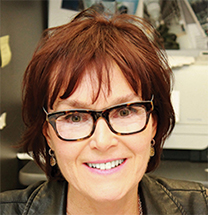Maquat celebrated for her service
and scientific achievements
Lynne E. Maquat, the J. Lowell Orbison endowed chair and director of the Center for RNA Biology at the University of Rochester Medical Center, is the recipient of the 2018 Federation of American Societies for Experimental BiologyExcellence in Science Award. Maquat is being recognized for her outstanding contributions to our understanding of RNA biology and her enthusiastic service to the scientific community.

“It is an honor to receive the FASEB Excellence in Science Award. I look forward to meeting many Experimental Biology 2018 participants, especially those just starting their careers. Even after establishing my own lab, I wasn’t sure that I would be a successful scientist. A career in science can have many unpredictable twists and turns. However, if you chip away in a steady and thoughtful way, you may be surprised at what you can accomplish.”
— LYNNE E. MAQUAT
FASEB established the Excellence in Science Award in 1989 to celebrate outstanding women in science who have made landmark scientific discoveries, shown leadership and a devotion to service in the broader scientific community, and shown dedication to the training of students and postdoctoral fellows.
Jeffrey J. Hayes, chair and Shohei Koide professor in the department of biochemistry and biophysics at the University of Rochester Medical Center, nominated Maquat for the award. “Lynne is a highly esteemed scientist who is a leader in mammalian gene expression and has contributed numerous seminal discoveries elucidating fundamental aspects of mRNA regulation,” Hayes wrote in his letter of nomination. “Lynne’s innovative work, her unparalleled contributions to science, her record of unselfish service to the scientific community and her efforts fostering future scientists’ careers, clearly indicate that she is an outstanding choice for the FASEB Excellence in Science Award.”
Maquat’s research on RNA decay pathways focuses on nonsense-mediated mRNA decay, or NMD, and how disruption of this pathway can lead to disease in humans. The NMD pathway targets mRNAs with premature stop codons for degradation, protecting against the potentially deleterious effects caused by expression of the truncated proteins encoded by these mRNAs. Maquat’s discovery and understanding of the NMD mechanism has been instrumental in the fundamental understanding of RNA biology, how disruption of RNA regulation can lead to diseases and how manipulation of this pathway could be used to treat those diseases.
Maquat also has been an outstanding role model for the scientific community outside the lab. In 2003, she established the University of Rochester Graduate Women in Science program to offer mentorship for women scientists and provide them with opportunities for professional and personal development. As president of the RNA Society, she also initiated networking and mentoring, and she is a constant advocate for diversity in the sciences.
Maquat earned her Ph.D. from the University of Wisconsin-Madison and decided to stay there for her postdoctoral work at the McArdle Laboratory for Cancer Research. Since joining the University of Rochester, she has published more than 135 papers in peer-reviewed journals and has been recognized with numerous awards including the Canada Gairdner International Award, the Vanderbilt Prize in Biomedical Science, an NIH MERIT Award, the International RNA Society Lifetime Achievement in Service Award, the International RNA Society Lifetime Achievement in Science Award and the Wiley Prize in Biomedical Sciences. She also has been elected to societies such as the National Academy of Sciences, the National Academy of Medicine, the American Academy of Arts and Sciences, and the American Association for the Advancement of Science.
Maquat will receive her award during the Experimental Biology 2018 meeting in San Diego, where she will deliver an award lecture titled “Nonsense-mediated mRNA decay and human disease: genome guardian and executor.” The presentation will take place at 9 a.m. April 22 in Room 6B in the San Diego Convention Center.
Enjoy reading ASBMB Today?
Become a member to receive the print edition four times a year and the digital edition monthly.
Learn moreGet the latest from ASBMB Today
Enter your email address, and we’ll send you a weekly email with recent articles, interviews and more.
Latest in People
People highlights or most popular articles

Finding a symphony among complex molecules
MOSAIC scholar Stanna Dorn uses total synthesis to recreate rare bacterial natural products with potential therapeutic applications.

Sketching, scribbling and scicomm
Graduate student Ari Paiz describes how her love of science and art blend to make her an effective science communicator.

Embrace your neurodivergence and flourish in college
This guide offers practical advice on setting yourself up for success — learn how to leverage campus resources, work with professors and embrace your strengths.

Survival tools for a neurodivergent brain in academia
Working in academia is hard, and being neurodivergent makes it harder. Here are a few tools that may help, from a Ph.D. student with ADHD.

Quieting the static: Building inclusive STEM classrooms
Christin Monroe, an assistant professor of chemistry at Landmark College, offers practical tips to help educators make their classrooms more accessible to neurodivergent scientists.

Hidden strengths of an autistic scientist
Navigating the world of scientific research as an autistic scientist comes with unique challenges —microaggressions, communication hurdles and the constant pressure to conform to social norms, postbaccalaureate student Taylor Stolberg writes.

